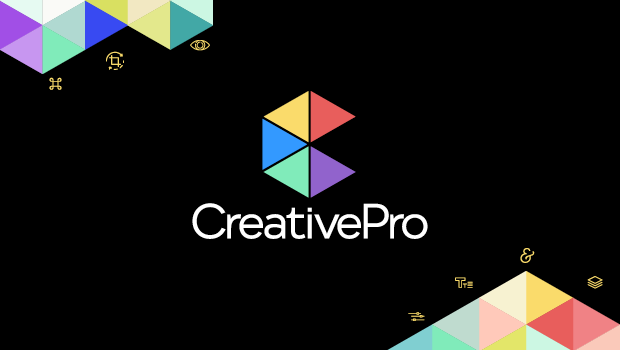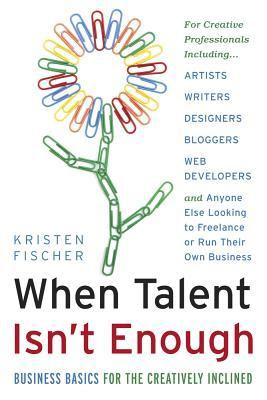It Takes More Than Talent

The following is an excerpt from When Talent Isn’t Enough: Business Basics for the Creatively Inclined by Kristen Fischer.

You can also download this excerpt as a PDF.
Reprinted, with permission of the publisher, from WHEN TALENT ISN’T ENOUGH © 2013 Kristen Fischer. Published by Career Press, Pompton Plains, NJ. 800-227-3371. All rights reserved.
It Takes More Than Talent
I was in the fourth grade when I wrote an essay about my kitten, Tangles. After my teacher, Mr. Wolf, read the piece, he nominated me to attend a young authors’ conference at our local community college. Mr. Wolf was the first person to recognize my talent. At the time, I didn’t know I had any.
It poked through as I grew, but it wasn’t until my sophomore in college when I was studying environmental science when it re-emerged. I heard that the school’s homecoming queen was selected via an essay contest and thought it was cool that the school picked royalty based on skill rather than looks. So I applied and, soon after, there I was, wearing a plum velvet gown and a rhinestone crown.
These were just glimpses of the talent that was inside of me—a gift that I never recognized until the crown came off, I had a bachelor’s degree, and began working. Upon graduation, I had little desire to save the earth; I knew my heart wasn’t in it.
There were some prospects for me to be an environmental scientist, but none caught my eye. On a whim, I decided to apply to be a reporter at a local newspaper and got the job. Now it was my duty to write. Seven years later, I am a full-time freelance copywriter and journalist.
I am intrigued by creative professionals. I have connected with solo professionals—or solo-pros, as I like to call them—that run the gamut. Some are veterans who freelanced before freelancing was hip, others are rookies off to a thriving start, and others are running a side business while they juggle a traditional full-time job. Most of them are genuinely talented, yet naively believe their artistic ability is all they need to be a business owner.
Some creatives talk more about their natural gifts than they do about delivering for the clients that are paying their bills. Many don’t work with their clients because they are “the talent”—and think they are somehow above providing customer service or building client relationships. Others can’t get out of the “starving artist” mentality and scrape by feeling completely unfulfilled.
There is definitely an important factor in using your talent to live off of, or just to lead a profitable side gig: You need to know how to run a business, not just create.
I subscribe to the theory that if your creative gift is your profession, you’re going to need to be able to sell what you produce or provide. That involves being more focused on staying in business and using your natural gifts to do so, and less about hand-picking clients and charging exorbitant rates because anything less would diminish your God-given gifts.
I’m aware there are different measures of success. Some creative professionals may not have to support themselves or their households financially, so whatever kind of creative gig they have is an accomplishment. Really, it doesn’t matter how you measure success. If you want a strong business that you enjoy, you need to possess some business awareness. That means building a client base, learning to work with clients that you may not love, filing taxes fairly, and mastering negotiations. It means keeping accurate records and marketing your business. And if you moonlight, it means going beyond “hobby mode,” whether you want to keep a side gig or turn it into a full-time career.
When I worked as a reporter, I was able to hone my writing abilities well and efficiently meet the editors’ needs. That carried over when I launched my copywriting business; even though most of what I write isn’t exactly hard-hitting prose (it is content used to sell products and services), I still know how to gather information and produce material that meets the needs of my clients—and often surpasses them.
My business has expanded to writing books and magazine articles, and I still use my editorial abilities. I love to write, whether it’s short, snappy content to sell products or a compelling, witty article in a magazine.
That said, I wouldn’t be where I am if I did not embrace professional best practices. My talent, no matter how wonderfully undiscovered and raw it was when I penned those essays earlier in life, wouldn’t have helped me create such a fulfilling career if I did not incorporate sound business strategies.
This is the key to long-term success as a creative professional: You have to do business and mean business to stay in business. Your talent is just as important, but it’s not the only thing that matters.
What is more important in running a creative business—your talent or your business know-how?
“This is one of those chicken–egg sorts of things. You need the talent to create work people will want but you need business skills to get the work seen and noticed. I have seen a lot of artists with so-so work and really great business skills make way more money than someone who has a lot of talent and no business skills. So business skills are definitely a must if you want to make a living from your work.”
—Claudine Hellmuth, illustrator/artist, www.claudinehellmuth.com
One can get by on one’s talent, but only for so long. Clients don’t want to hire the artist that won’t incorporate their feedback—otherwise, they won’t refer that ever-so-talented artist to their colleagues. People talk in the industry. It does not take long to see that one guy is difficult to work with, and a company can hire someone just as gifted who is willing to work with them. The same goes for the administrative end of it: You may be a pro with clients lined up around the block, but if you don’t pay taxes on what you have earned, Uncle Sam will come knocking.
Creatives have different priorities for their businesses; one of mine is being able to live a comfortable lifestyle—not to have to work 40 hours a week, every week. To be able to work from where I want, and have my choice of clients. To enjoy the projects I take on and have a steady pipeline of work coming in. Through time, I’ve been able to make my vision a reality. Every day isn’t perfect, nor is every client, but I wouldn’t want to be doing anything else with my life. I want you to be able to do the same, no matter what your ambitions entail.
According to the 2012 Freelance Industry Report (available at www.internationalfreelancersday.com/2012report), people launch their own creative business for a number of reasons. About 28 percent of freelancers chose to go solo for more freedom and flexibility, 23 percent did so to follow their passion, 13 percent wanted to be their own boss, and 29 percent got into it “accidentally.”
Regardless of how they started their own businesses, this chapter will introduce you to some freelancers who appreciate and have developed their talent—and who integrate business principles into their career. This chapter will not discount that your talent is probably amazing; instead, it will give you the tools you need to draw upon it and excel as a creative professional.
Do you think many people let their ego over their talent get in the way of business?
“I tend to see younger and less-experienced creatives get tangled in ego issues. This manifests itself in an unhealthy “us vs. them” mentality. To a degree most creatives have some level of ego, but it’s about keeping things in check while still remaining confident. At the end of the day, people don’t want to hire and work with jerks no matter how talented they are. Make the interaction about building a partnership and not battling an adversary.”
—Jay Rogers, designer/illustrator, www.jayrodesign.com
Getting Started: Setting Up Shop…or Studio
One part of launching a creative business that does not involve your artistic ability is deciding to earn money off your talents, whether it is a side business or your primary role.
Von Glitschka (www.vonglitschka.com), an illustrative designer from Oregon, has been in business for more than a decade. (You may know him because we hosted the Freelance Radio [www.freelanceradio.com] podcast together, along with our moonlighter friend, Dickie Adams. You may also know Glitschka’s name because he is an author, teacher, and speaker.)
One of the biggest reasons Glitschka has been so successful is because he took time to learn about business when he began. Just because marketing and client relations were two facets of business that came naturally to him, he was still aware that he needed legal and financial advice because those areas were not his strong suits.
He retained a business lawyer, who explained how tax, payroll, and bookkeeping systems worked. Then one of his clients told him about a small business management program at a local college; he took the course. He says it was extremely intimidating because he is not a math fan, but it helped tremendously.
“I signed up and became friends with the guy that ran it and he mentored me,” recalls Glitschka. “He got to know my business, and then audited how I could improve it business wise. That was a big eye opener.”
As a result, he decided to hire a bookkeeper and a CPA. Though he isn’t glued to a calculator, he knows what records to keep so these professionals can accurately report his earnings. That’s doing business.
Just as you would with any other venture, it’s important to do things properly. In other words, even though you can probably set up your creative business in your spare bedroom (mine only required a computer, technically), that’s not necessarily enough. Choosing a business model, devising professional goals, and formulating your internal processes are just as important.
As a result of the strong business platform, Glitschka has been able to build an impressive reputation for himself and garner top-name clients—all while providing for his family financially.
“I know creative people who’d I consider better than me and they are struggling to make ends meet…not because of lack of skill, talent or craft, but due to lack of business sense and operating a business,” he says. “Commercial artists may be commercially centric but they can still be starving artists if they don’t know business basics.”
How can a creative individual decide if he or she should start their own business or just freelance on the side?
“I did it the moonlighting way. I had a day job and I worked really hard at my own business until it was so big I could barely keep up. I got laid off in a company-wide layoff and just at the time my own business was really starting to take over so it was perfect timing. The disadvantage is you have to essentially work two jobs, your real job and the one you are building, but the advantage is you can do it without worrying about money and that takes a lot of pressure off your little fledging business.”
—Claudine Hellmuth, illustrator/artist, www.claudinehellmuth.com
Why Creating Isn’t Enough
Chances are, you realize that you need more than just your artistic side to make your business work. Obviously you will need to engage clients, which involves marketing and selling, too.
Glitschka says that too many creative professionals believe if they simply create, the clients will come, and—bam!—they are in business. That’s not the case. Your artistic flair can be the greatest thing out there, but you need to be the one marketing yourself so prospects see why you are the best for the project. Otherwise, someone with just as much talent and business sense will get those jobs. Let’s face it: Someone else can generate deliverables just as lovely as yours, but not all creatives can combine the talent and business know-how—and that’s what separates flourishing business owners from those who try freelancing and are forced to go back to a 9-to-5 job they dislike.
Stephanie Jones (www.cleverfinch.com), a designer from Virginia, worked at numerous advertising agencies in account planning and strategy before delving into the artistic world. This background has been effective in helping her meet her clients’ goals. She never had to step off a high horse of “I have my talent and that’s all I need,” when she started her creative enterprise; she knew business was equally as important from the start.
“I always knew how important it was to be professional with my business, even when it’s not focused on the fun part,” she says. “Being a strategic resource for your clients builds value, and you don’t just build that by creating pretty design pieces.”
Finding Your Creative Edge
Glitschka is a natural connector, and leverages this ability to cultivate what I call the creative edge. Your creative edge is comprised of the things that set you apart from others when you use your natural abilities. I’m not talking only about your artistic talents; I mean strengths like speaking, listening, writing, coaching, analyzing, mediating, and networking. These aspects, along with your talent and business expertise, can become your competitive advantage.
Glitschka is also involved in the design community. Spending time online communicating with fellow designers and creatives, as well as attending in-person events, has helped him to stand out as a thought leader in the industry. Clients want the “go-to guy” for their campaigns; they want the very best and turn to him for it. This has given him a creative edge.
Why do freelancers need to learn more about business basics?
“While legal and financial advisors can help with things such as incorporation, taxes, contracts, and collections, you still need to know the basics. How much should you charge? When should payment be due? What can you do when a client is late or refuses to pay? Things are continually changing in our industry. So, it’s not only important to keep up on current trends and software, but also with changing laws, policies, and more.”
—Julie Cortés, co-founder, www.freelancersu.com
Customer Service Trumps Talent
Is the customer always right? It’s the age-old debate. Although the customer may very well be wrong sometimes, in most cases, they are paying you to do a job that goes beyond using your creative abilities; it involves meeting their needs and expectations, and that requires more than your ability to write, paint, or design.
So many creatives are wrapped up in their artistic ability and the way they think a project should go, and do not partner with clients. Upon the first inkling of criticism, they insist their artwork is best and refuse to compromise. Ultimately, this can trigger a tense relationship or lead to the end of it—along with the added drama of a check “in the mail” that never arrives. From there, it can become a legal matter—just another reason why you must be business-savvy.
This article was last modified on July 7, 2023
This article was first published on March 8, 2013
Commenting is easier and faster when you're logged in!
Recommended for you

Markzware Releases Free FlightCheck Update
Markzware, the leading developer of preflighting, data extraction and conversion...

TypeTalk: Horizontal Alignment
TypeTalk is a regular blog on typography. Post your questions and comments by cl...

How to Use and Edit Multipart Fonts
See how to take advantage of multipart fonts in your designs




